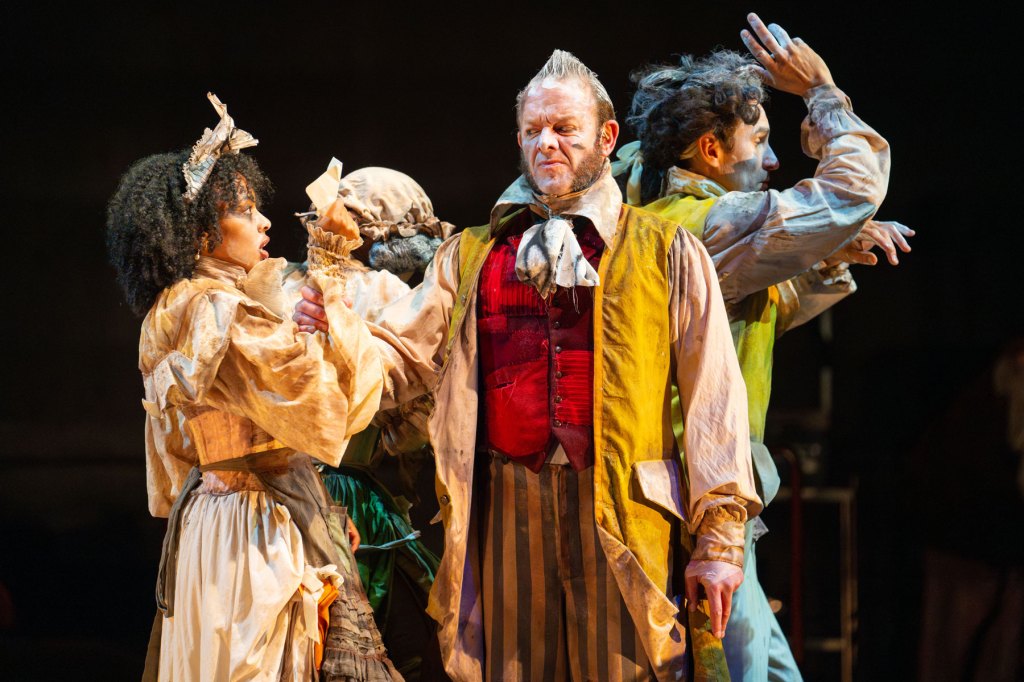Theatre review: Jack Maggs
Audiences are immersed in the grimy and gothic vaudeville atmosphere of Victorian London in an astounding new adaptation of Peter Carey’s reimagining of Dickens’ Great Expectations that exposes the slippery nature of truth.

As the audience gradually fills the Dunstan Playhouse for State Theatre Company SA’s Jack Maggs, the dimly lit stage is already full of curious action. We are peeking into the secret world behind the curtain of a Victorian-era theatre with actors limbering up and pacing the boards between the rigging ropes. Faces are smeared with greasepaint, the players ready to pull on the wigs and breeches of their stage personas.
Everything speaks of poverty, the well-worn costumes grimy with coal dust, shabby wardrobes that have seen better days and the backdrop curtain lying in a long puddle of patched cloth across the stage.
But the moment the backdrop is hoisted and this play within a play begins, all we think we know about this famous story slips from our grasp.
Peter Carey’s internationally celebrated novel Jack Maggs cleverly reimagined Charles Dickens’ classic work Great Expectations by recentring the story on the minor character of Magwitch, investing the escaped convict with a real name, Jack Maggs, and brutal penal colony backstory. Now, South Australian playwright Samuel Adamson has taken Carey’s literary method and applied it to this stage adaptation – this time placing the story in the hands of another previously overlooked character, Mercy Larkin, a housemaid recently saved from selling herself on the streets.
As Mercy (Ahunim Abebe) steps forward, claiming all previous versions of the story to be lies, we are swept into the squalor of Victorian London in 1837. In Mercy’s play, The True History of Jack Maggs, the escaped convict Maggs (Mark Saturno) returns from his banishment to Australia in search of his “son” Henry Phipps (Carey’s version of Pip in Dickens’ Great Expectations).

Jack Maggs features a deliciously colourful cast of characters. Photo: Matt Byrne
You might like
During his exile, Maggs has been a benefactor to Phipps, raising him from poverty and setting him up in an expensive house. Now back in his hometown, Maggs is desperate to show how far he has risen from his beginnings as a thief and immediately seeks out Phipps, only to find the house he has financed to be empty.
Next door, Mercy Larkin’s household is in an uproar. Her master, Percy Buckle (Nathan O’Keefe), is having famed novelist and “mesmerist” Tobias Oates (James Smith) to dinner and housekeeper Mrs Halfstairs (Jacqy Phillips) is in a state. They are short a footman (the last took his own life), and since footmen are like bookends – they come in pairs – one must be found immediately to work alongside the heartbroken Mr Constable (Dale March).
Maggs sees his opportunity to access the house next door, dons the footman’s livery and soon finds himself ladling soup for the charismatic author (Oates being a thinly-veiled version of Dickens).
During the dinner, Oates “mesmerises” Maggs and sees “hobgoblins living in his head like beetles in a log”. With this glimpse of Maggs’ brutal history, the novelist recognises the potential for a new story and swiftly strikes a bargain. Maggs agrees to be mesmerised for 18 days and in return Oates will pay a professional “thief-taker” to find Mr Phipps. The deal is struck, but soon it becomes clear that everyone has secrets that if brought to light could bring ruin.

Jack Maggs incorporates shadow play and magic lantern effects. Photo: Matt Byrne
Theft, blackmail, adultery, exploitation, abortion, suicide and identity: there is a great deal at play in this story, and the first half barrels along, jam-packed with action and humour. Every appearance of the Buckle household is absolutely delightful, and Oates’ bombastic self-importance keeps the energy high the entire time.
Subscribe for updates
It is testament to Adamson’s writing that so much story can be crammed into a little over two hours of stage time. Every character, whether main or minor, is exceptionally well-drawn, all granted opportunities to display both integrity and imperfection.
When the humour fades as the characters’ storylines take a darker turn in the second half, the exceptional standard of the acting, brilliant writing and clever stagecraft carries the audience with rapt attention to the dénouement.
It is difficult to single out one performance from this stellar cast: Saturno and Smith are powerhouses, March and O’Keefe are constantly smile-inducing, and Phillips, Rachel Burke and Jelena Nicdao invest every character they play with delicious energy. But the standout is Abebe, who simply lights up the stage with her potent blend of charisma and pathos.

Ahunim Abebe is a standout as Mercy Larkin. Photo: Matt Byrne
Huge kudos to the direction and stagecraft of this impressive production. Under Geordie Brookman’s cool, professional hand this intricately staged and complex production appears seamless. Ailsa Paterson’s stage design is so extraordinary it is almost distracting, the grimy and gothic vaudeville atmosphere, clever use of mobile Victorian furniture as scene settings, and the shabby-chic patchwork of the backdrop curtains are works of art.
Special mention also needs to be made of Nigel Levings’ lighting design, with his brilliant shadow play and magic lantern effects enhancing the gorgeous Victorian flavour of the set.
There is so much to say about this astounding adaptation of the novel, which turns both Dickens’ and Carey’s versions on their heads. Both the novels and this script have the slipperiness of reality and the power of storytelling at their core, showing readers and audiences how “truth” depends on the perspective from which the story is told.
In this world-class play of a Miles Franklin-award-winning novel that remakes a Dickens classic, we are shown that certainty depends on who is allowed to speak, and that theft can take many forms – even something as ephemeral as a story can be stolen.
State Theatre Company South Australia is presenting Jack Maggs at the Dunstan Playhouse until November 30.

